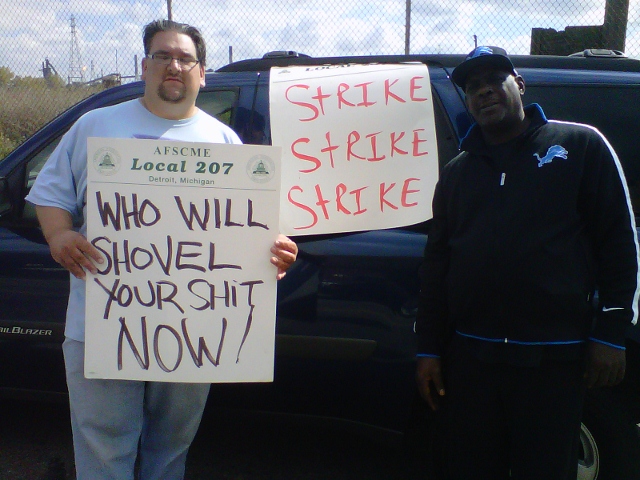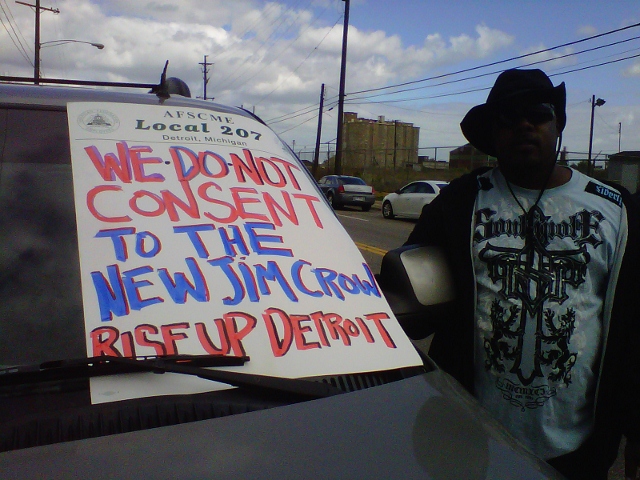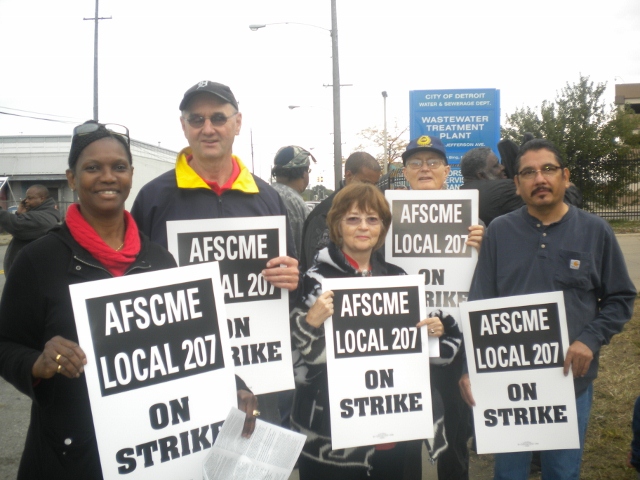by Ron Lare
October 8, 2012
On Thurs. Oct. 4, Detroit AFSCME Local 207’s water department workers ended a strike begun Sun. Sept. 30. The predominantly African-American union local represents 950 city workers.
The local struck against a contract proposal that would pave the way for the Board of Water Commissioners’ to eliminate over 80% of Local 207 jobs. The risk of firing for an illegal public employee strike was balanced by the expectation that without a real victory almost all jobs would be gone anyway.
On Sun. Sept. 30 wastewater treatment plant pump house workers, Crew 5, walked out and the rest of the plant struck the next day. The strikers faced down their powerful opponents long enough to spark interest among workers in the other several Detroit city unions and beyond.

Other Detroit employee locals had settled for 10% pay cuts, increased health care costs, paying to stay in defined-benefit pension plans and other concessions. The Detroit-based UAW had accepted nearly a 50% cut for new hires, a “standard” that haunts the region.
The capitalist assault on Michigan cities privatizes public facilities and services, breaks unions, and eliminates even capitalist “democracy” in municipal governance. This is done via layoffs, firings, and restructuring. “Emergency managers” have been dictatorially imposed by both Republican and Democratic Michigan Governors to run several majority people of color cities and school districts. (My daughter’s Detroit school district’s first emergency manager was appointed by Democratic Governor Granholm. A former General Motors executive now holds the school emergency manager position.)

Current Republican Governor Snyder’s appointed body now holds power in Detroit—-an emergency manager dictatorship thinly disguised by a “consent agreement.” [See Dianne Feeley’s “The Takeover of Motor City” for background on the emergency manager law.] A major petitioning effort has put the emergency manager law question on the November ballot and formally suspended the law, but the situation has changed little pending the election.
Why, then, were the AFSCME Local 207 leaders not jailed for defying the injunction, as in the case of PATCO and other strikes? Probably because a big enough confrontation in one key local could destabilize the “emergency manager” governance system. There was the risk that other workers would be too horrified or too inspired to keep surrendering. The city needed to finesse this situation.
AFSCME Local 207 President John Riehl was not allowed into bargaining. That smacks of trusteeship right off the bat. The negotiations were attended by Detroit Water and Sewerage Department management, Detroit City Council, the Detroit Mayor’s office officials, AFSCME Council 25 leaders, and Local 207’s own attorneys who communicated with the Local 207 officers.
Management even proposed elimination of the union recognition clause. Some joked that management couldn’t even “recognize” officers’ signatures if they agreed to this.
Union electricians, carpenters, laborers, operating engineers and most truck drivers refused to cross the picket lines. Half the local’s members work on fresh water delivery systems outside the waste water processing plant. Most of these honored the strike, but local officers told us that Council 25 attempted to persuade them not to strike.
UAW Local 2200 (“Metropolitan Detroit Professionals”) already had a contract with the city. 2200 is a small supervisors’ local in the plant. Its in-plant UAW rep reportedly advised members not to go to work, but some did.
US District Judge Sean Cox almost immediately ordered the strikers back to work. This was followed by suspensions “pending termination” for 34 (now 36). These included three local officers. The injunction and other abuses lean partly on federal oversight of Detroit water dating to 1977.
Autoworker strike supporters put out a call for picket line volunteers on autoworker activist lists (Autoworker Caravan and Soldiers of Solidarity). A leading Occupy Detroit eviction defense activist and attorney put out the call to Occupy Detroit. Some of my fellow UAW Local 600 members visited the lines in a group.

At 3 am on day two of the strike, the picket lines turned away 10 of 12 trucks.
The news media provided management’s response. On Oct. 3, the Detroit News and Detroit Free Press headlines read, “Detroit water department strikers suspended, will be fired for ‘gross misconduct’“ and “Detroit Water suspends 34, seeks their firing”
Yet the strike continued.
The federal judge who issued the injunction had decreed that the union could not even raise some subjects at the bargaining table. Management offered a one-year contract, to expire next summer.
Victory?
You can read Local 207’s victory declarations on the local’s web site, but I cannot see the result as a victory. The claims of victory on the web site rely substantially on promises to negotiate and the local’s right to join in legal actions. The language we have heard so far is too vague for solid interpretation, all the less given this management’s record.
If it is a victory to get strikers returned to work, it is a victory for management not to have to disclose in the agreement the final disposition of the disciplinary measures. These carry the potential to wipe out the local, now without the credible threat of a strike.
As they return to work after suspensions, the disciplined strikers are on probation. Management can fire them or suspend them again, even by manufacturing incidents. “Last chance letters” are an issue I have experience fighting over for fellow Ford workers.
Defying the federal injunction is a useful example locally and nationally. However, in my book victory would mean real progress toward reversing the city’s water department privatization and job elimination plans. It certainly would have not meant such lingering disciplinary vulnerability.
Whether they succeeded, retreated or failed, I’m glad someone stood up and said “No.” A union struck a blow like no one else against the destruction of unions and democracy in Detroit by using not just legalistic or electoral initiatives but real labor action, a strike. How often does that happen, win lose or draw?
This local membership needs united Detroit and national labor-left support, as it is not going to get support from the union bureaucracy.
The impact on the labor movement here in Detroit is contradictory. Some are more intimidated. Some are more inspired and proud that somebody fought. The latter seems to be the reaction of our UAW Local 600 members. For Detroit city contracts and jobs numbers and public ownership to be ravaged without some strike somewhere would leave more demoralization and intimidation than a brave and bold, even if defeated strike.
Local 207 President John Riehl told a group of picketers: “Like I tell everyone, this is a political strike. This is not just an economic strike.”
Favoring Brother Riehl’s point, the strike was indeed against the government of Detroit. It defied a federal injunction. Yet the claims in the local’s strike bulletins are too sweeping. They are counterproductive in building support from the Detroit labor left. For example, according to the AFSCME 207 site, Local 207 leadership sees itself “as both union leaders and a new political leadership for the city of Detroit.” (See Strike Bulletin #3)
Unrealistic claims about the local’s power coming out of the strike distract from the strike’s real significance: “Local 207 increased its power during the course of the strike.” It doesn’t look that way.
The Chicago teachers’ strike is a useful model. Without the CTU’s many thousands of members and a natural base like the Chicago parents and students to whom a long, intensive and successful appeal was made, the 207 struggle was all the more in need of an organized, city-wide mobilization. No one has yet successfully shown how to counter the conservatizing influence of the Detroit area Democratic Party, its united front with the Republicans, the union bureaucracy unwilling to fight, and the capitalists’ neoliberal offensive that the bureaucracies surrender to or buy into.
There may yet be other shoes to drop. AFSCME higher-ups have a history of attempting to put Local 207 into trusteeship.
Donations to this local that is subject to suspensions and possible firings are accepted via checks made out to “AFSMCE Local 207”, and mailed to AFSCME Local 207, 600 W. Lafayette, Suite L-106, Detroit MI 48225. There is a PayPal account under “Public Utility Employees of the City of Detroit, Michigan”. This is still a local union membership under ferocious attack and in need of assistance. All the more so if I am correct about a retreat rather than a victory, and about what the real relationship of forces augurs for the future of brave and bold members and a leadership willing to go with a strike in the face of overwhelming odds.
Ron Lare is a retired member of UAW Local 600 in Detroit.

Comments
One response to “Water Workers’ Strike Fights the Power in Detroit”
Here are links to other radical coverage of the strike apart from the AFSCME 207 site linked in this article. The general view of these articles, like that of the AFSCME 207 web site, is that the strike ended in victory. The Michigan Citizen article states that the disciplined officers are on last chance letters. –Ron Lare
The Michigan Citizen:
http://michigancitizen.com/water-workers-back-to-work-on-probation/
Workers World:
http://www.workers.org/2012/10/12/detroit-waste-water-workers-score-victories-end-strike/
Voice of Detroit:
http://voiceofdetroit.net/2012/10/04/detroit-afscme-207-water-strike-ends-in-victory/